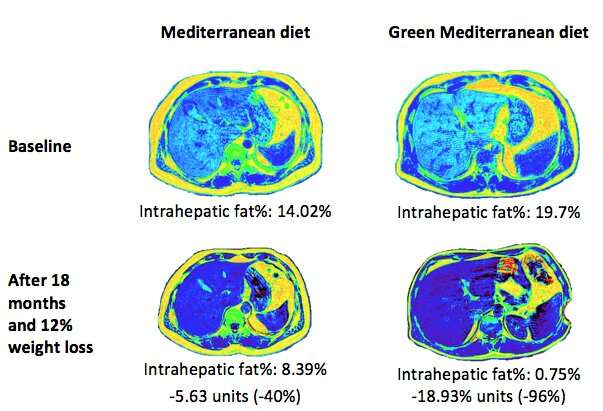
A green Mediterranean (MED) diet reduces intrahepatic fat more than other healthy diets and cuts non-alcoholic fatty liver disease (NAFLD) in half, according to a long-term clinical intervention trial led by Ben-Gurion University of the Negev researchers and a team of international colleagues.
The findings were published in Gut, a leading international journal focused on gastroenterology and hepatology.
“Our research team and other groups over the past 20 years have proven through rigorous randomized long-term trials that the Mediterranean diet is the healthiest,” says lead researcher Prof. Iris Shai, an epidemiologist in the BGU School of Public Health who is also an adjunct lecturer at the Harvard T.H. Chan School of Public Health. “Now, we have refined that diet and discovered elements that can make dramatic changes to hepatic fat and other key health factors.” Other Harvard investigators are Profs. Meir Stampfer and Frank Hu, chair of the Department of Nutrition at the Chan School.
NAFLD affects 25% to 30% of people in the United States and Europe. While some fat is normal in the liver, excessive fat (5% or higher) leads to insulin resistance, type 2 diabetes, cardiovascular risk, as well as decreased gut microbiome diversity and microbial imbalance. Since no drug is currently available to treat fatty liver, the only intervention is weight loss and curtailing of alcohol consumption.
This MRI-nutritional clinical trial (called Direct-Plus), conducted by an international research team led by Prof. Shai is the first to develop and test a new green Mediterranean diet. This modified MED diet is rich in vegetables, includes daily intake of walnuts (28 grams), and less processed and red meat. It is enriched with green components, high in polyphenols, including three to four cups of green tea/day and 100 grams (frozen cubes/day) of a Mankai green shake. Mankai, an aquatic green plant also known as duckweed, is high in bioavailable protein, iron, B12, vitamins, minerals, and polyphenols.
“Addressing this common liver disease by targeted lifestyle intervention might promote a more effective nutritional strategy,” says Dr. Anat Yaskolka-Meir, first author and member of the BGU School of Public Health. “This clinical trial demonstrates an effective nutritional tool for NAFLD beyond weight loss.”
This 18-month trial DIRECT-PLUS began in 2017 at the Nuclear Research Center Negev in Dimona, Israel, when 294 workers in their fifties with abdominal obesity were randomly divided into three groups: healthy dietary regimen, Mediterranean diet and green Mediterranean diet. In addition to the diet, all the participants were given a physical exercise regimen with a free gym membership. The participants underwent MRI scans to quantify the exact proportion of excess intrahepatic fat before and after the trial.
The results showed that every diet led to liver fat reduction. However, the green MED diet resulted in the greatest reduction of hepatic fat (-39%), as compared to the traditional Mediterranean diet (-20%) and the healthy dietary guidelines (-12%). The results were significant after adjusting for weight loss.
Overall, the green MED diet produced dramatic reductions in fatty liver. NAFLD prevalence dropped from 62% at baseline to 31.5% in the green Mediterranean group, down to 47.9% in the Mediterranean group and 54.8% in the healthy dietary regimen group.
Source: Read Full Article


